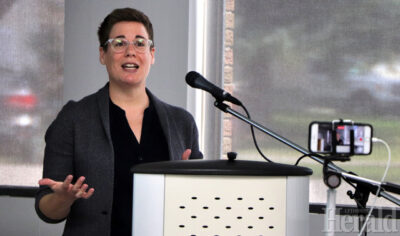Limits on freedom of expression discussed at SACPA session
By Steffanie Costigan - Lethbridge Herald Local Journalism Initiative Reporter on April 26, 2024.
 Herald photo by Steffanie Costigan
Susan Dieleman, associate professor of philosophy at the U of L, speaks during Thursday's SACPA session.
Herald photo by Steffanie Costigan
Susan Dieleman, associate professor of philosophy at the U of L, speaks during Thursday's SACPA session.A University of Lethbridge professor spoke on the topic of existing arguments for and against limiting freedom of expression at the Southern Alberta Council on Public Affairs session on Thursday at the Lethbridge Senior Citizens Organization.
Guest speaker, associate professor of philosophy Susan Dieleman, posed the question, “why place limits on freedom of expression?”
She followed up by stating she would remain neutral in discussing further on the posed question.
“I’ll be looking at the background arguments, the arguments that are used to defend freedom of expression and not place limits on freedom of expression.
“And then arguments that suggest, ‘well, in some cases, maybe we should actually limit free speech.’ There might be good reasons for doing that. So that’s my plan for the talk to look at the arguments on either side,” said Dieleman.
Dieleman noted the Supreme Court of Canada identified three points to the argument of freedom of expression.
“Supreme courts as well have identified these three arguments. And they are picking out three specific arguments for why we think freedom of expression or free speech is important,” she said.
She described the three points with one of them being epistemic arguments, “There is an epistemic argument having to do with knowledge…
“There are political arguments in support a free speech or freedom of expression as well, generally having to do with how we protect our democratic institutions and decision-making procedures.”
Dieleman talked about political arguments with freedom of expression along with the moral arguments made.
“There is a political argument that can be offered for freedom of speech. And there’s also a moral argument that’s captured in that last part of the passage, individual self-fulfillment and human flourishing, where the idea is that we protect free speech, because that is how individual people’s right or ability to pursue their own conception of what it means to be a good life to live a good life is protected,” she said.
She also talked about the consequentialist argument.
“It’s referring to the good consequences of protecting free speech. It suggests that we should do something like protect free speech because there are good consequences that follow if we do. So, for the epistemic argument. We’ve got a consequentialist argument that says there are good epistemic consequences that follow if we protect free speech.”
Dieleman said on the flip side there are arguments against freedom of speech within the Charter.
“In the Charter, there is a suggestion that well, you can place limits on these rights,if there’s good reason to do so. And that it can be justified…
“And so these arguments are suggesting, well, there might be good reasons to, in some cases, for some reasons, limit free speech or place limits on certain kinds of speech.”
In closing she talked about the questions posed to break down the other sides arguments.
“In opposition to those arguments will look a little bit different. So, if you’re looking at a consequentialist argument that says there should not be limits on free speech, what the opposing argument would do is ask, ‘well, are those epistemic benefits or political benefits those good consequences achieved? When there are no restrictions on speech? Maybe it will be the case,’ according to these arguments that limits on speech of certain kinds of speech, actually do a better job of helping us achieve those consequences,” said Dieleman.
19-18


